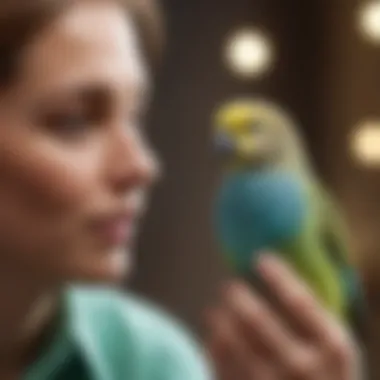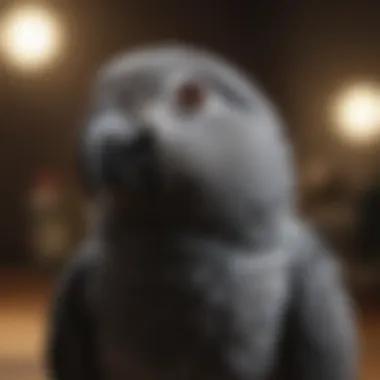Top Talking Birds for Beginner Avian Enthusiasts


Intro
In the realm of pet ownership, birds stand out for their intelligence and beauty. Beginners often seek talking birds specifically due to their engaging nature and capacity for bonding. However, choosing the right species can be daunting. Through this article, we will guide novice bird enthusiasts in discovering potential talking companions. Each step considers factors like temperament, trainability, and suitability for beginners, as well as their care needs.
Avian Care Basics
Importance of Proper Nutrition
Feeding your bird properly is crucial. Birds require a balanced diet to thrive. Different species have different dietary needs. Parrots often enjoy a diet rich in grains, fruits, vegetables, and seeding. Additionally, providing specialized pellets is also advised. For example, foods designed for specific species, like Zupreem pellets for parrots, help support overall health.
Understanding Bird Species and Their Needs
Every bird species comes with unique care requirements. Some birds, like cockatiels, are compassionate and social, while others, such as African greys, may require more complex mental stimulation. Knowing the basics about ihre behavior patterns and habitats is necessary to ensure their well-being.
- Cockatiels - Sociable and gentle, suitable for families.
- Budgerigars - Friendly and playful, perfect for beginners.
- Amazons - Highly trainable and melodious, yet can be noisier.
Basics of Birds Habitat Setup
An appropriate habitat is essential for your bird’s health and happiness. The enclosure should be spacious enough for freedom of movement but secure. Line the bottom with safe bedding and position the habitat away from direct sunlight or overheating. Include various perches and toys to keep the bird engaged.
Grooming and Hygiene Tips
Grooming affects both health and comfort. Regularly check your bird’s feathers and nails. A shallow bath or a mist can encourage cleaning behaviors. Use safe cleaning products for the cage itself to prevent the buildup of bacteria or parasites.
Interacting with Your Pet Bird
Building Trust and Connection
To nurture a relationship with your bird, spending time in its presence is vital. Maintaining a calm demeanor helps in establishing trust. Speak softly and approach the bird slowly. Over time, this bond can develop into a strong friendship.
Training Techniques and Tips
When training talking birds, patience is crucial. Begin with simple commands, using positive reinforcement methods. For instance, rewarding your bird with a treat when it repeats a word can encourage further mimicry. Consistency plays a major hand in progress; spend time each day focused on training.
Fun Activities for Bird Owners and Their Birds
Incorporating playtime each day strengthens your bond during shared activities. Interactive toys, like foraging puzzles, stimulate their minds. Additionally, providing supervised out-of-cage time is beneficial. Yet, keep a watchful eye on their explorations to avert any trouble.
Recognizing Bird Cues and Behaviors
Learning bird behavior nuances is essential. Birds exhibit various cues like feather ruffling, beak grinding, or loud calls indicating mood changes. This awareness fosters a better understanding of your pet’s emotional state, which is vital for their overall happiness.
Emotional Well-Being of Birds
The Role of Play and Socialization
Birds are social creatures; thus, interaction is advantageous. Socialization with family members can lead to well-adjusted behavior. Moreover, offering activities that challenge physical and cognitive skills plays a large role in promoting positivity.
Enhancing Birds' Emotional Health
Positive reinforcement can help enhance the emotional health of pet birds. Enrichment activities like training and play keep them engaged. Rotate toys or introduce new challenges to prevent boredom.
Assessing Bird Stress and Remedies
Understanding signs of stress enables caregivers to address issues promptly. Look for behaviors like excessive vocalizations or feather plucking. Creating a calm atmosphere, plus ensuring they feel secure, can drive their contentment.
Building Strong Human-Bird Bonds
To foster a strong bond, consider frequent interactions. Designate time daily to engage. Follow their lead and let them be comfortable enough to roam and explore, ultimately resulting in trust and a strong connection.
Bird Health and Safety
Common Health Issues and Prevention
Birds can face various health challenges. Depending on species, conditions differ. For example, sour crop in parrots or respiratory problems in finches may arise. Regular dietary monitoring helps in prevention.
Routine Veterinary Care
Routine vet check-ups should not be neglected. Ensure vaccinations are up to date and seek consultancy for new or unusual behaviors that may signal underlying issues. Partnering with avian medicine professionals can make all the difference.
Environmental Hazards to Avoid


Birds are susceptible to specific indoor hazards, such as ceiling fans or toxic plants. Awareness reduces risk when creating safe spaces tailored for your bird. Always examine your home for potential dangers before letting your bird roam free.
Signs of Illness or Distress
Familiarize yourself with distress signals, such as a changed appetite or lethargy. Early identification allows timely intervention, which can prevent worsening conditions.
Fun Facts and Quirky Insights
Unique Traits of Popular Bird Species
Federally protected species like the California condor showcase nature's wonder. Birds such as the Caique exhibit remarkable dance skills, demonstrating lively behavior. Their intelligence can often successfully imitate human speech, further endearing them to those who take the time to bond.
Historical and Cultural Significance of Birds
Birds hold significant fame across cultures and times, viewed as symbols of freedom and expression. Artful representations can be seen in works by John James Audubon or internationally recognized emblems.
Famous Bird Owners and Their Stories
Various celebrities have cherished birds. For instance, actor Johnny Depp showcases the joy pet birds bring. Their stories exemplifying connection emphasize the potential of a rich human-animal bond.
In summary, understanding the nuances of bird care equips prospective owners with the tools neede to take on ownership realistically.
Prolusion to Talking Birds
Talking birds have a unique charm that draws people to consider them as pets. Understanding what talking birds are and what makes them special is essential for anyone considering adding one to their family. This section lays the groundwork by explaining their defining traits and social aspects, addressing the criteria that identify the ideal companion bird for beginners.
Understanding Talking Birds
Talking birds are bird species that have the ability to mimic human speech and other sounds. This characteristic is not only entertaining but also establishes a bond between the bird and its owner. Common talking birds, such as the Budgerigar and the African Grey Parrot, showcase varying degrees of vocalization skills.
These birds are social creatures. They communicate naturally within their flocks. Their ability to learn and mimic extends beyond words; they may also imitate environmental sounds, like ringing phones or doorbells. This adds a layer of interaction that captivates many bird enthusiasts.
Moreover, their cognitive abilities make them more than just pets; they become companions. The engagement in communication enhances the owner-bird relationship, enabling rich interactions that can be gratifying.
Why Choose a Talking Bird?
Deciding to welcome a talking bird into your life carries many advantages. The first is the social interaction they provide. Unlike other pets, talking birds can foster a deeper relationship through vocalizations. They can recognize voices, contributing to a unique companionship that many pet owners find immensely satisfying.
Another strong point is their adaptability. Many species of talking birds are relatively easy to care for. Starting with patience and consistency in training can yield a rewarding experience suitable even for beginners. Also, these birds come in various sizes and temperaments, making it easy to find a species that fits into different lifestyles comfortably.
Additionally, owning a talking bird can positively affect mental well-being. Engaging with a bird has therapeutic benefits. Listening to a bird mimic and communicate can bring joy and help alleviate stress. The nuances and sounds can change moods—bringing life and warmth into a home.
In summary, understanding talking birds is critical to ensuring that prospective owners can make informed decisions. Knowing their behavioral traits allows one to establish an appropriate environment and enrich the experience of bird ownership.
Key Considerations for Beginners
When considering a talking bird, new owners must emphasize certain key aspects to create a fulfilling experience. These include understanding how a bird’s lifestyle needs align with your own and recognizing the space required for their well-being. Making informed choices ensures that both the bird and owner can form a enriched companionship.
Lifestyle Compatibility
Evaluating lifestyle compatibility is essential before bringing a talking bird home. Potential bird owners should reflect on their daily routines, activity levels, and overall preferences. Birds, especially the ones known for their vocal abilities, can be sensitive to environment and human interaction. Consider factors such as time spent at home, potential noise levels, and how a bird's behavior fits into your daily life.
- If you have a demanding job, or extended times away from home, perhaps a more independent species such as a budgerigar is ideal.
- Alternatively, if you can dedicate regular interaction, a cockatiel may prove to be satisfactory due to its friendly disposition.
Understand that each bird has its own behavioral tendencies, which directly correlate to its trainability and socialization capabilities. By matching your lifestyle with the right bird, you not only ease your responsibilities but also significantly enhance the harmony between you and your feathered companion.
Space and Habitat Requirements
Birds necessitate a healthy habitat that supports their physical and psychological well-being. Assessing your space is crucial. First, decide where the bird will reside. Provide a safe cage that has enough room for flying. Space is vital for physical exercise as well as social activities.
Space considerations include:
- Horizontal space: Many flying birds beneficially utilize lateral movement. Therefore, selecting a cage that offers ample horizontal space can better satisfy a bird’s psychological needs.
- Height of the cage: Ideal cages are tall to allow for vertical movement, especially for species accustomed to climbing.
- Play area: Consider dedicated play zones equipped with safe perches, toys, and mental stimulation items for the bird outside of the cage.
You should ensure the bird's space allows for freedom without overwhelming them. Location is also crucial. Keep cages away from drafts, direct sunlight, and excessive humidity.
Popular Talking Bird Species
When considering talking birds for beginners, understanding the various species available is essential. Each type of bird comes with its unique attributes, both in the sense of personality and vocal ability. This section aims to highlight the most popular species that can meet the needs and interests of first-time bird owners. Key elements that will be considered include trainability, adaptability, and social interaction aspects.
Budgerigar
Characteristics


Budgerigars, often called budgies, are small and vibrant. Their colors range from green to blue, and they possess an outgoing temperament. This friendly nature contributes significantly to their popularity among new bird owners. Their natural inclination towards mimicry sets them apart, as many budgies can learn to talk with proper training.
Care Requirements
Caring for a budgerigar is relatively straightforward. They thrive in spacious cages and require a simple diet of seeds and vegetables. Daily mental stimulation such as toys or interaction with owners is crucial. Budgies do not have extensive space needs, making them suitable for apartment living. Their resilience to common ailments also makes them a reliable pet choice.
Training Techniques
Training a budgerigar often revolves around positive reinforcement. Short sessions using treats help establish communication. Their naturally curious nature aids in learning. This training can result in effective learning of basic commands and words, which is gratifying for new owners because their progress is often visible within weeks.
Cockatiel
Characteristics
Cockatiels are well-known for their charming and social personalities. The crested head, along with unique whistles, adds to their appeal. They typically develop strong bonds with their owners. These birds enjoy interaction and attention, establishing them as a favored choice for novices.
Care Requirements
Cockatiels require a larger cage compared to budgies, depending on their size. A mixed diet of seeds, pellets, and occasional fruits or vegetables is essential. Regular out-of-cage time nurtures their need for socialization. Attention to their grooming helps maintain their health, marking them as low-maintenance companions if properly cared for.
Training Techniques
Training cockatiels demands patience and diet-based rewards. They can sometimes take longer to mimic speech than budgies, focusing more on earning trust than quick learning. Connecting through basic tricks or whistles tends to result in long-term partnerships between bird and owner. Their keen intelligence and good-natured personality aid in wipeing difficult tasks away with time.
African Grey Parrot
Characteristics
African Grey Parrots stand out due to their exceptional speech abilities and intelligence level. They can seamlessly replicate human voices and sounds. Their highly intellective nature scares some new owners, but with comprehensive understanding, they become wonderful assets. They engage easily in conversation and can form deep connections with their human companions.
Care Requirements
They need well-balanced nutrition that includes pellets, veggies, and occasional nuts. African Greys require ample mental stimulation to avoid stemming boredom. This species commands a larger living space, reflecting their size and mental needs. While adaptive, they are more sensitive, thus deserving strict supervision concerning stress.
Training Techniques
Training an African Grey essentially emphasizes mental engagement. Socializing early and consistently leads to clear idea about expectations. Without this preparation, prolonged progress can stagnate. They may take longer than others to learn but once they do, understanding and dynamic interaction flourish remarkably.
Potential Challenges
This type presents obstacles for beginners, including behavior quirks and health assurance. Their sensitive nature can be impacted by environmental changes. New owners may find feeding and habitat demanding more effort, requiring consistent commitment. Comprehensive literature and community support help current users expertly.
Quaker Parrot
Characteristics
Quaker Parrots, or Monk Parakeets, are distinctive for their lively behaviours. These birds display huge social skills and showcase attractive, greenish plumage. They encounter fewer demanding needs than some others, permitting for easy integration into household. Their potential for speaking abilities adds significant appeal.
Care Requirements
Feeding your Quaker consists mainly of similar seeds, vegetables, and occasional protein based add-ons. Social structure nurtured by community and friends is key. Birds prefer fellow companionship thus cultivating good practices of care further ensures attachment. Their cages have to be large since they require room for exploration and minimal inherent boring conditions should they occur.
Training Techniques
Training Quaker Parrots initiates with socialization and repetition. Given their intelligence, structured training integrates familiarity faster containing demands for owner's attention. They show propensity to mimic unlike any inexperienced counterpart once adaptation set in. Progress can shift quite substantially with different methods for teaching vocalization directions or information.
Consider these birds according to your daily lifestyle needs, commitment, and engagement you possess. Each species offers unique advantages which needs proper contemplating prior selection.
Considerations for Bird Training
Training is an integral aspect of having a talking bird. Understanding how to train effectively can greatly enhance the relationship between the bird and the owner. Proper training can lead to better behavior, stronger bonds, and fewer frustrations.
When considering bird training, it’s crucial to acknowledge the individual temperament of different species. Each bird has its own learning pace, and recognizing this will help in setting realistic expectations. Additionally, many species thrive on regular interaction and stimulation. A lack of stimulating activities can result in stress and unwanted behavior, making it vital to engage your bird through targeted training sessions.
Training methodologies also play a significant role in how well a bird learns. Employing correct techniques will ensure that the bird receives everything it needs to flourish in a home environment. With these elements in mind, one can foster a positive, patient approach towards bird training.
Start with Basic Commands
Beginning a training regimen with basic commands is fundamental. Teaching commands such as
Socialization and Bonding


Importance of Socialization
Socialization plays a crucial role in the well-being of talking birds. When a bird is properly socialized, it becomes more accustomed to human interaction. This can lead to a friendlier temperament. Birds that lack socialization can display fearful or aggressive behavior. This not only affects their ability to bond with their owners but can also lead to health issues caused by stress.
Socialization should ideally start as early as possible. Getting a young bird used to various sounds, sights, and people will prepare it for life in a diverse environment. It's beneficial to introduce your bird to different stimuli in a controlled manner, allowing it to gradually build confidence.
Additionally, regular interaction, whether through playtime, training, or simple talk, reinforces the bond between you and your bird. Through conversation, your pet bird begins to recognize your voice and learn social cues. Bird owners must invest time and patience into this process,as it significantly impacts overall happiness and behavior.
Building Trust with Your Bird
Building trust is another cornerstone of socialization. For a bird, trust comes from consistent, gentle interactions. Forcing an interaction can foster fear rather than closeness. Start with gentle talking and gradually move to friendly gestures. Offering treats can create positive associations that reinforce trust. Non-threatening body language is also essential when working with birds. Avoid sudden movements; instead, approach your bird slowly.
A good initial step is allowing your bird time to observe you without interference. Over time, you can offer your hand and allow your bird to approach at its own pace. In addition, respect your bird's comfort zone. If it seems agitated, take a step back. With time and care, your patience will help develop a strong bond.
Birds can be incredibly social creatures. Establishing a bond based on trust can unlock their potential to become engaging companions who respond to training and interaction.
Common Challenges Faced by Beginners
Understanding the common challenges associated with bird ownership is vital for novice avian enthusiasts. This section will elaborate on two major issues: behavioral problems and health concerns. Addressing these challenges early ensures a smoother experience with your talking bird and can significantly enhance your bird's quality of life.
Behavioral Issues
Behavioral issues are often prominent among beginner bird owners. These problems can manifest in various ways, ranging from excessive screaming to aggression. One common cause of these behaviors is lack of socialization. Beginners may not realize the extent to which talking birds require interaction and mental stimulation.
To mitigate potential issues, consider the following:
- Consistent Training: Establish routines for commands and tricks to keep your bird engaged.
- Environmental Enrichment: Provide toys and other activities that promote exploration and mental challenge.
- Attention and Affection: Spend quality time with your bird to build trust and comfort.
Many birds thrive on positive reinforcement during training sessions. Neglecting social needs or failing to provide adequate stimulation can result in undesirable behavior that frustrates both bird and owner. This may lead to the birds developing tactics to get attention, which can escalate into more challenging behavioral issues.
"Birds are highly social creatures. They need interaction to stay happy and healthy."
Health Concerns
Health is another crucial aspect that beginners must understand. New bird owners may underestimate the specific health needs of their avian companions. Routine veterinary visits and awareness of signs of illness are essential.
Common health concerns include:
- Respiratory Issues: Birds are sensitive to poor air quality and airborne toxins.
- Obesity: A diet high in seeds without grains and pellets can lead to weight problems.
- Wing and Leg Injuries: Birds can easily injure themselves during play, making it important to have spacious habitats that minimize risk.
Preventive care is foundational to keeping your avian companion healthy. Seeking routine veterinary advice will help ensure that any emerging health issues are detected early. Learning about the natural history and care of your specific talking bird species can equip you with necessary insights and prevention strategies. Thus, being proactive can significantly improve not only the health but also the happiness of your bird.
Resources for New Bird Owners
Having a pet bird can be a rewarding experience. However, first-time bird owners often face challenges related to their new companions. This section dives into essential resources designed for new bird owners that will provide guidance and support. The right resources can not only alleviate frustrations but also facilitate a better understanding of avian care and behavior.
Books and Online Communities
There are many books that cover varied aspects of bird ownership. These can be invaluable tools for beginners. Textbooks on avian care elucidate topics such as dietary requirements, behaviors, and health. Look for titles such as "The Bird Owner's Manual" or "Parrots for Dummies." These works often provide step-by-step guides and tips on everyday challenges that bird owners encounter.
Additionally, online communities serve as excellent platforms for new owners to seek advice and share insights. Websites like reddit.com and facebook.com host dedicated groups where enthusiasts and novice owners discuss problems or experiences. Being part of these communities can connect individuals with those facing similar challenges and allow for knowledge exchange. It is a way to find support and receive recommendations from fellow bird owners routinely.
Remember that every bird is unique. A personal approach based on your chief insights will shape your companion experience!
Veterinary Support and Consultation
Consulting with a veterinarian familiar with birds is crucial for any new pelican proprietor. Bird health can be complex. Regular check-ups help detect early issues and ensure vaccines or treatments are timely. Avian vets can also provide nutritional advice tailor-made for your bird species. It is good to have a vet who understands the tendencies and needs of different types of talking birds.
In emergencies, quick access to veterinary services can save your bird's life or improve a serious health issue. Creating a list of avian veterinary clinics can help you respond to any ailment or injury immediately. Resources such as online professional directories make it easier to find certified professionals in your area. This step will provide peace of mind knowing you have support readily available.
Adhering to expert advice from reliable resources empowers new bird owners to navigate the intricate ecosystem of avian care successfully.
Epilogue
Owning a talking bird can be a rewarding and enriching experience, especially for those new to the world of avian care. Reflecting on the diversity of species like the budgerigar, cockatiel, and African grey parrot provides insight into the nuances of parrot ownership. Each bird is unique and comes with its specific needs, wishes, and temperaments. Understanding these features can greatly assist potential bird owners in making informed choices for their future companions.
Recap of Important Points
- Species Selection: Choosing the right species is paramount. Focus on temperament and trainability. Beginners often find budgerigars or cockatiels a suitable start.
- Training Essentials: Master basic commands using positive reinforcement. Develop a routine that fosters engagement and trust.
- Socialization: Prioritize socializing your bird. Trust-building is a continuous process that requires patience and consistency.
- Health and Behavior: New owners should be mindful of common health issues. Understanding behavioral cues is crucial.
- Resources: Leverage books, online communities, and veterinary advice for a well-rounded support system as you embark on your bird-keeping journey.
Final Thoughts on Choosing a Talking Bird
This decision can influence the harmony in your home. The emotional bond formed with a talking bird extends beyond mere companionship. Consider factors like interaction level and activity needs. Not just aesthetics, acquiring a bird needs thoughtful contemplation about your lifestyle.
Your journey into the world of talking birds should be approached intentionally, designed to create lasting connections, fostering a support network around you for informed bird care.
Whether you opt for the playful nature of a quaker parrot or the intelligence of an African grey, each choice can lead to a mature relationship, enhancing both your life and that of your bird.
Explore more about avian care using resources like Wikipedia, Britannica, or engage in discussions on Reddit to share experiences and knowledge.















